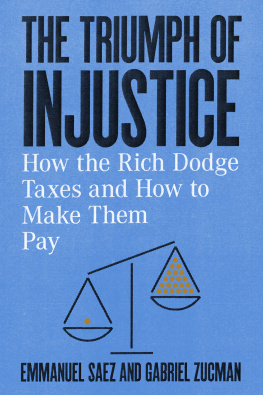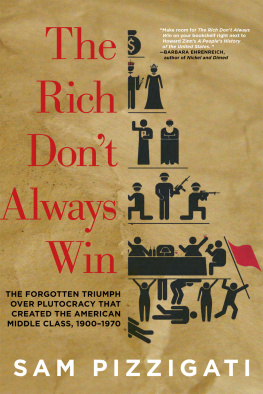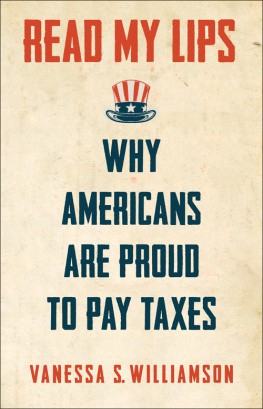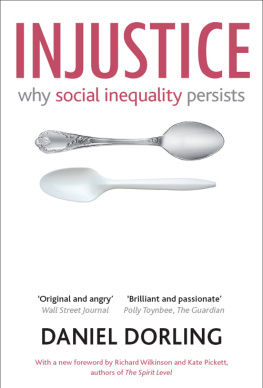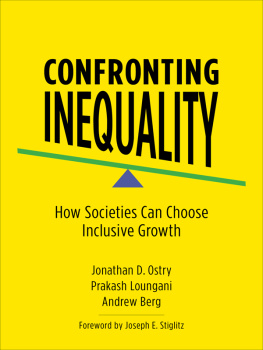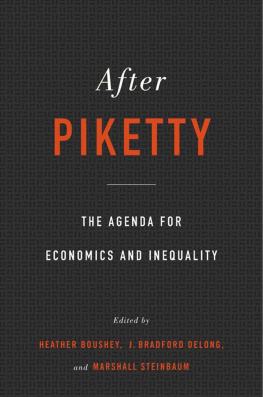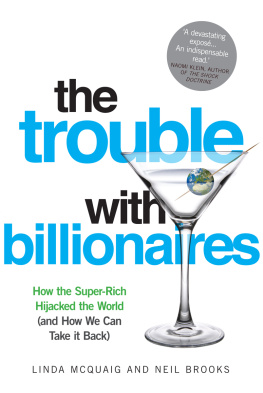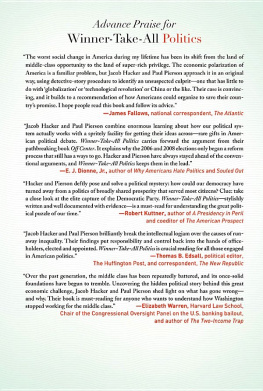Contents
Guide

THE
TRIUMPH
OF
INJUSTICE
How the Rich
Dodge Taxes and
How to Make Them Pay
EMMANUEL SAEZ
AND GABRIEL ZUCMAN

Web addresses appearing in this book reflect existing links as of the date of first publication. No endorsement of, or affiliation with, any third-party website should be inferred. W. W. Norton & Co., Inc., is not responsible for third-party content (website, blog, information page, or otherwise).
Copyright 2019 by Emmanuel Saez and Gabriel Zucman
All rights reserved
First Edition
For information about permission to reproduce selections from this book, write to Permissions, W. W. Norton & Company, Inc., 500 Fifth Avenue, New York, NY 10110
For information about special discounts for bulk purchases, please contact W. W. Norton Special Sales at specialsales@wwnorton.com or 800-233-4830
Jacket design and illustration by Milan Bozic
Book design by Lovedog Studio
Production manager: Beth Steidle
ISBN 978-1-324-00272-7
ISBN 978-1-324-00273-4 (Ebook)
W. W. Norton & Company, Inc.
500 Fifth Avenue, New York, N.Y. 10110
www.wwnorton.com
W. W. Norton & Company Ltd.
15 Carlisle Street, London W1D 3BS
CONTENTS
T he evening of September 26, 2016, was off to a good start for Hillary Clinton. The former secretary of state had the upper hand in her first election debate against Donald Trump, the reality-show celebrity who had won the Republican primary. Nervous and aggressive, the GOP candidate kept interrupting his opponent. The Democratic candidate, well prepared and relaxed, kept scoring pointswhen suddenly the debate turned to taxes.
Breaking with a tradition dating back to the early 1970s, Trump had refused to release his tax returns, claiming he was prevented by an ongoing audit from the Internal Revenue Service. Clinton baited the billionaire real estate developer into talking about how little he had paid over the years: The only tax returns that anybodys seen was when he was trying to get a casino license, and they showed he didnt pay any federal income tax. Trump proudly admitted to it: That makes me smart. Clinton did not snap back. A dispassionate exposition of the well-crafted, carefully weighted, thoughtful technocratic fixes she had envisioned for the nations tax code would not have carried the day.
Politically, That makes me smart was a shrewd line. That one of the countrys wealthiest men could, by his own admission, pay no tax at all was so absurd that it reinforced the central narrative of the Trump campaign: The Washington, DC, establishment had failed the country. The tax code, like everything else, was rigged. In Trumps answer there was an echo of President Ronald Reagan himself, who famously compared the tax code to daily mugging. In both Trumps and Reagans views, the relentless pursuit of self-interest supports the prosperity of all. Capitalism harnesses human greed for the greater good. Taxes are a hindrance and avoiding them is the right thing to do.
At the same time, That makes me smart exposed the paradox of this ideology. Relentless self-interest destroys the norms of trust and cooperation at the heart of any prosperous society. Trump himself would be nothing without the infrastructure that connects his skyscrapers to the rest of the world, the sewer system that carries their waste, the teachers who taught his lawyers how to read, the doctors and the public research that keep him healthy, let alone the laws and courts that protect his property. What makes communities thrive is not any unfettered free-for-all, it is cooperation and collective action. Without taxes there is no cooperation, no prosperity, no common destinythere is not even a nation in need of a president.
Trumps boast revealed a failure of American society. It had become so natural that the affluent do not contribute to the public coffers that a candidate for the presidency would openly admit to it while his opponent offered no clear solution in response. The countrys tax systemthe most important institution of any democratic societyhad failed.
We wrote this book with two objectives in mind: the first, to understand how exactly the United States got into this mess; the second, to help fix it.
THE TRIUMPH OF INJUSTICE
Candidate Trumps admission was only anecdotal evidence of a new injustice in America. Even as their incomes boomed, as they reaped the rewards from globalization, and their wealth skyrocketed to previously unseen heights, the most fortunate Americans have seen their tax rates fall. Meanwhile, for the working class, wages stagnated, work conditions deteriorated, debts ballooned, and taxes rose. Since 1980 the tax system has enriched the winners in the market economy and impoverished those who realized few rewards from economic growth.
Any democracy must debate the proper size of government and the ideal degree of tax progressivity. Informed by history and international experience, by statistics and abstract reasoning, it is natural for individuals and countries alike to sometimes change views. But have the tax policy changes of the last decades been the result of such an informed deliberation? Has the collapse in taxes for the ultra-rich reflected what Americans as a society wanted?
We doubt it. Some of these changes were the result of conscious choices. But many more have been borne passively: the outbreak of a tax-avoidance industry that obscures income and wealth; the emergence, with globalization, of new loopholes exploited by multinational companies; the spiral of international tax competition that has led countries to slash their tax rates one after another. Most of the changes in taxation are due not to a sudden popular appetite for exempting the wealthy, but to forces that have prevailed without input from voters. Whether or not tax cuts can have positive economic effects, the upheavals of the last decades are not, by and large, the product of rational choices deliberated on and made by an informed citizenry. The triumph of tax injustice is, above all, a denial of democracy.
The first contribution of this book is to tell the story of this great transformation. Our story is not one of Left versus Right. It is not about the triumph of small-government conservatives over spread-the-wealth liberals. It is the story of how the tax system established by the New Deal was undermined. At each step of its demise, we find the same pattern. It starts with an outburst of tax avoidance. It continues with policymakers letting this tax avoidance fester, paralyzed by supposedly invincible foestax shelters, globalization, tax havens, financial opacity. And it ends with governments slashing the tax rates of the wealthy under the pretense that taxing the richest among us had become impossible.
To understand this injustice, and which choices (and non-choices) have contributed to its triumph, we have undertaken an in-depth economic investigation. Drawing on a century of statistics, we have estimated how much each social group, from the poorest up to billionaires, has paid in tax since 1913 in the United States. Our data series include all taxes paid to the federal, state, and local governments: the federal income tax, of course, but also state income taxes, myriad sales and excise taxes, the corporate income tax, business and residential property taxes, and payroll taxes. The distinction between taxes paid by households and taxes paid by businesses is meaningless: all taxes are paid by people, and our work allocates all taxes to existing individuals over more than a century.

